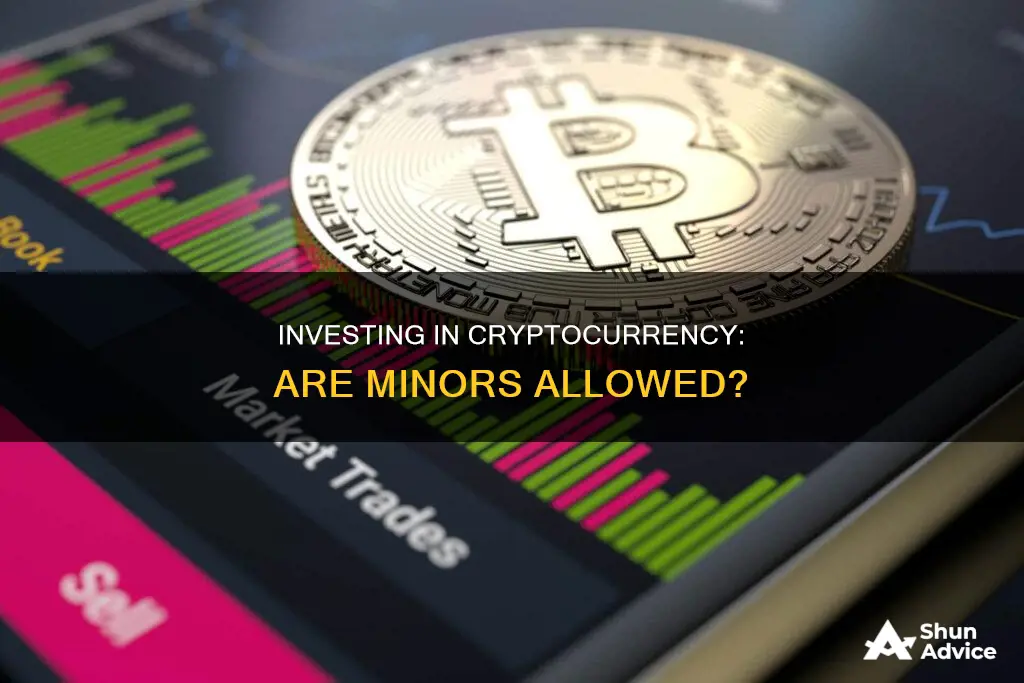
Investing in cryptocurrency is an enticing prospect for teenagers, as it represents a wave of future finance that is innovative and radically different from how older generations invest. While there are no laws explicitly prohibiting minors from investing in cryptocurrencies, many exchanges have established their own policies, prohibiting individuals under 18 from registering, purchasing, or trading. This creates a predicament for ambitious teenagers who are unable to legally control their own accounts. Fortunately, there are alternative exchanges that do not require ID verification, as well as specialised custodial crypto services that allow parents to oversee their children's investments.
| Characteristics | Values |
|---|---|
| Legality of investing in cryptocurrency under 18 | In most countries, there are no laws prohibiting under-18s from buying crypto. |
| Age restrictions on crypto exchanges | Many reputable exchanges have their own policies prohibiting users under 18 from registering, purchasing or trading. |
| Identity verification on crypto exchanges | Many exchanges require identity verification, which prevents users under 18 from signing up. |
| Alternative crypto exchanges for under 18s | Some exchanges do not require ID verification, allowing under-18s to buy crypto anonymously. |
| Risks of investing in cryptocurrency under 18 | Cryptocurrency is an exceptionally volatile asset, and there is a risk of losing your entire investment. |
| Parental involvement in crypto investing for under 18s | It is recommended that under-18s discuss any investment decisions with their parents or legal guardians. |
| Custodial accounts for crypto investing under 18 | Custodial accounts can be set up by parents or guardians, allowing them to manage the purchasing of crypto assets on behalf of a minor. |
What You'll Learn

No specific laws prohibit under-18s from buying crypto
While there are no laws against minors investing in cryptocurrencies, many exchanges require users to be 18 or older. This creates a predicament for ambitious young investors who are excited to buy their first Bitcoin or Ethereum coins but are unable to legally control their own accounts.
Custodial Accounts
Fortunately, specialised custodial crypto services cater to this younger audience by appointing parent-controlled accounts on the child's behalf, fully compliant with exchange terms. Parents can track balances and activity until the specified turn-over date when the child assumes full account authority at 18.
Research Exchange Reputation and Security First
It's important to thoroughly vet any crypto exchange before creating accounts. Reputable exchanges like Coinbase, Gemini, and Kraken publish transparent company information, demonstrating good security reputations. This builds trust with users of all ages looking to securely enter the crypto economy.
Building a Diverse Cryptocurrency Portfolio
With oversight permissions in place through custodial setups, underage beginners can diversify across top-tier crypto assets and smaller alternative coins by conveniently funding accounts via credit cards or bank transfers.
Transfer Crypto Assets to a Personal Wallet Upon Turning 18
When a minor turns 18, they must complete updated know-your-customer (KYC) checks to verify their new adult status. Exchanges then review submitted documentation before granting independence to manage wallet and trading activities.
The Ultimate Guide: Investing in Bitcoin for Beginners
You may want to see also

Crypto exchanges with no ID verification
There are no laws prohibiting minors from investing in cryptocurrencies. However, many U.S.-based crypto exchanges require users to be at least 18 years old. This means that, while it is not illegal for teenagers to invest in crypto, they may face barriers when trying to enter the market.
If you are under 18 and want to purchase cryptocurrency, there are alternative crypto exchanges that do not require Know Your Customer (KYC) verification. These exchanges allow you to buy crypto without providing identification, even if you are a minor. Here are some of the top crypto exchanges that offer this anonymity:
- Bybit: A global platform with over 10 million users, Bybit allows you to buy crypto using various payment methods, including credit/debit cards, bank transfers, Google Pay, and Apple Pay. Bybit does not require ID verification, but it is inaccessible in the United States due to IP address restrictions.
- Kine: A decentralized exchange (DEX) that offers anonymous accounts without ID verification. Kine supports the purchase of USDT and provides avenues for earning interest through staking or farming. It also offers derivatives trading with low fees of 0.05%.
- KuCoin: One of the world's largest crypto platforms, KuCoin offers a wide range of 700+ coins for trading. It simplifies the process of buying crypto with fiat currency and provides multiple payment options. Trading fees are set at a competitive 0.1%, and you can get a 20% discount by paying fees with KuCoin's native token (KCS).
- Margex: Margex offers a user-friendly way to acquire crypto without ID and supports credit/debit card transactions. It stands out for its excellent security measures, with all user assets stored in cold storage. Margex also has a robust system to prevent price manipulation and enhance market integrity.
- Weex: Weex is a great option if you want to trade crypto without identity verification. It offers fee-free spot trading, high liquidity, minimal slippage, and copy trading. Weex specializes in futures trading, with low fees of 0.02/0.06% and a range of 30+ trading pairs.
- PrimeXBT: This platform allows you to buy CFDs (contracts for difference), enabling you to bet on cryptocurrency prices rising or falling. PrimeXBT offers live chat support and low trading fees of 0.05%, but it is important to note that you do not own the actual cryptocurrency when trading CFDs.
- Bisq: A fully decentralized Bitcoin exchange that allows you to buy and trade Bitcoin anonymously, without even providing your name. Bisq supports over 125+ cryptocurrencies and offers more than 15 payment methods. Trading fees are low, with maker fees at 0.05% and taker fees at 0.35%. However, as a decentralized platform, Bisq may not be suitable for beginners.
While these exchanges offer anonymity and accessibility to minors, it is important to remember that investing in cryptocurrency carries significant risks. Crypto is an exceptionally volatile asset, and you could potentially lose your entire investment. Therefore, if you are under 18, it is advisable to discuss any investment decisions with your parents or legal guardian and conduct thorough research before investing.
Coinbase: A Smart Investment Move or Miss?
You may want to see also

Crypto custodial accounts for minors
Crypto custodial accounts are typically described as UGMA/UTMA accounts, based on the Uniform Gifts to Minors Act or the Uniform Transfers to Minors Act—the legislature that allowed for the formation of these custodial accounts. There are two types of custodial accounts for minors:
Uniform Gift to Minors Act (UGMA) Account
A UGMA account is a type of custodial account where the account holder can contribute cash, securities (financial items you can invest in, such as stocks and bonds), and insurance policies.
Uniform Transfer to Minors Act (UTMA) Account
A UTMA account is a type of custodial account where the account holder can contribute any type of investment. Like UGMA accounts, owners can contribute cash and investments. They can also put physical assets such as real estate into these accounts.
While there are no current regulations preventing minors from investing in cryptocurrencies, they face barriers to entry as many U.S.-based crypto exchanges require users to be at least 18 years old. Crypto custodial accounts are a way to circumvent this problem.
For example, EarlyBird is one of the first custodial accounts to offer crypto investing. Adults can deposit funds into a child's EarlyBird account and, within the account, choose to invest in Bitcoin or Ethereum.
It is important to note that while crypto custodial accounts allow minors to invest in cryptocurrencies, the adult who opened the account cannot take the money back out. When the beneficiary reaches a certain age (either 18 or 21, depending on the state), they get full control of the account.
Apex Coin: Why CPX is a Smart Investment
You may want to see also

Risks of investing in cryptocurrency
Investing in cryptocurrency carries a high level of risk, and individuals should be aware of these risks before investing. Here are some of the key risks associated with investing in cryptocurrencies:
- Volatility: Cryptocurrencies are highly volatile, and their prices can fluctuate sharply and suddenly due to unexpected changes in market sentiment. This volatility makes it challenging for investors to build confidence and secure gains.
- Unregulated Market: Cryptocurrencies are currently unregulated by governments and central banks, which can lead to price manipulation and increased risk of loss. The lack of regulatory frameworks also creates uncertainty regarding tax treatment and future restrictions.
- Susceptibility to Error and Hacking: Technical glitches, human error, and hacking are common issues in the cryptocurrency market. Trading platforms and third-party service providers may be vulnerable to hacking or other malicious activities, leading to potential financial losses.
- Forks and Discontinuation: Cryptocurrency trading is subject to additional risks such as hard forks or discontinuation of a particular cryptocurrency. These events can cause substantial price volatility and impact an investor's portfolio.
- Loss of Private Key: Cryptocurrencies are typically stored in a digital wallet, and access to the wallet is controlled by both a public and private key. If the private key is lost, destroyed, or compromised, an investor may lose access to their cryptocurrencies with no way to recover them.
- Peer-to-Peer Transaction Risks: Digital currencies can be traded on online platforms or through peer-to-peer transactions. In peer-to-peer transactions, all risks, such as double-selling, lie solely between the transacting parties, and there may be no intermediary to facilitate dispute resolution.
- Loss of Confidence: Cryptocurrencies are not backed by central banks or other financial institutions, and their value is determined solely by market participants. A loss of confidence in these digital assets can lead to a rapid collapse in trading activities and a sharp drop in value.
- Currency-Conversion Risks: Policies or interruptions in the deposit or withdrawal of fiat currency on trading platforms can impact investors' ability to convert between fiat and digital currencies. This can trigger a decrease in pricing and trading volume.
- Taxation: There is a lack of clarity regarding the tax treatment of cryptocurrencies across different jurisdictions. Investors may face unexpected tax liabilities or challenges in complying with tax regulations, impacting their overall returns.
- Network Slow-Down: Cryptocurrencies rely on mining or transaction verification processes, which can slow down if the volume of transactions is high or if the rewards for these processes are insufficient. This can affect the efficiency of transactions and potentially impact the value of the cryptocurrency.
Why PF-70 Silver Coins Are Worth Investing In
You may want to see also

Alternatives to direct crypto investing
While there are no laws prohibiting minors from investing in cryptocurrencies, many US-based crypto exchanges require users to be at least 18 years old. If you are under 18 and interested in investing in cryptocurrencies, it is advisable to discuss any investment decisions with your parents or legal guardian, conduct thorough research, and only invest what you can afford to lose. Here are some alternatives to direct crypto investing:
- Real Estate Investment Trusts (REITs)or Real Estate-Focused Exchange-Traded Funds (ETFs): By investing in REITs or real estate-focused ETFs, you can gain exposure to the real estate market while reducing risk. REITs offer the opportunity to invest directly in commercial and residential real estate projects, and some pay out regular dividends from rents collected.
- Precious Metalssuch as Gold, Silver, and Platinum: Precious metals offer a way to invest outside the stock market. Gold is known for its stable purchasing power over time, while other precious metals can provide the potential for high returns or high losses.
- Collectiblessuch as Baseball Cards, Pokémon Cards, Classic Cars, and Artwork: Collectibles can be a good way to invest a small portion of your money with the potential for significant returns. However, it's important to note that collectible prices are highly volatile, and there is a significant risk of loss if you buy at the wrong time.
- Crypto-Related Stocks: Instead of investing directly in cryptocurrencies, you can invest in individual companies related to blockchain technology or the crypto market. For example, Coinbase Global Inc. (COIN) is a crypto exchange, and its value is indirectly tied to the crypto market.
- Crypto Exchange-Traded Funds (ETFs): Crypto ETFs are traded like stocks, and they offer a more regulated and secure way to invest in cryptocurrencies. The US Securities and Exchange Commission (SEC) approved crypto ETFs in 2024.
Libra Coin: Should You Invest?
You may want to see also
Frequently asked questions
No, it is not illegal for minors to invest in cryptocurrency. However, many crypto exchanges require users to be at least 18 years old and will not allow registration without ID verification.
There are several ways for minors to invest in cryptocurrency. One option is to use a custodial account, where a parent or guardian opens and manages an account on behalf of the minor. Another option is to use a decentralised exchange, which does not require ID verification. Additionally, minors can buy cryptocurrency through Bitcoin ATMs, peer-to-peer exchanges, or receiving it as payment for work or freelancing.
Cryptocurrency is a highly volatile and unregulated asset, so there is a high risk of losing money. It is important for minors to have parental guidance and support when investing in cryptocurrency.
Minors can explore other speculative investments such as real estate investment trusts (REITs), precious metals like gold and silver, or collectibles like baseball cards and artwork. These options can provide diversification and potentially lower risk compared to cryptocurrency.







